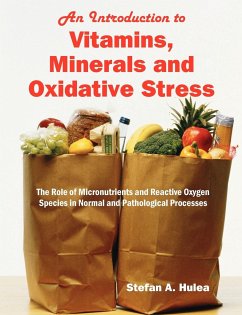
An Introduction to Vitamins, Minerals and Oxidative Stress
The Role of Micronutrients and Reactive Oxygen Species in Normal and Pathological Processes
Versandkostenfrei!
Versandfertig in 1-2 Wochen
35,99 €
inkl. MwSt.

PAYBACK Punkte
18 °P sammeln!
This book presents in simple and concise terms the biological functions of vitamins and minerals, what makes them essential to life and why they must be replenished daily from food. The best food sources for these micronutrients and the daily recommended intakes of vitamins and minerals are also presented. Information on these important micronutrients is all presented in one place (Part I) as opposed to the current text books where it is scattered throughout the text, making its retrieval tedious and time-consuming. In addition, the trace elements get an adequate coverage in contrast to the cu...
This book presents in simple and concise terms the biological functions of vitamins and minerals, what makes them essential to life and why they must be replenished daily from food. The best food sources for these micronutrients and the daily recommended intakes of vitamins and minerals are also presented. Information on these important micronutrients is all presented in one place (Part I) as opposed to the current text books where it is scattered throughout the text, making its retrieval tedious and time-consuming. In addition, the trace elements get an adequate coverage in contrast to the current texts. The second part introduces the reader to the concept of oxidative stress and the role of free radicals (mainly of oxygen and nitrogen) in the regulation of several biological processes like cellular redox homeostasis, programmed cell death and aging as well as their involvement in many pathological conditions such as cardiovascular disease, cancer, autoimmune and neurodegenerative diseases. Readers will also learn how reactive molecular species are generated, what their targets are and how cells defend themselves against the deleterious action of free radicals. Despite the growing interest in the research of free radicals involvement in human pathology the current text books treat the subject only sparingly. Our text addresses this issue by giving the topic the attention it deserves.


